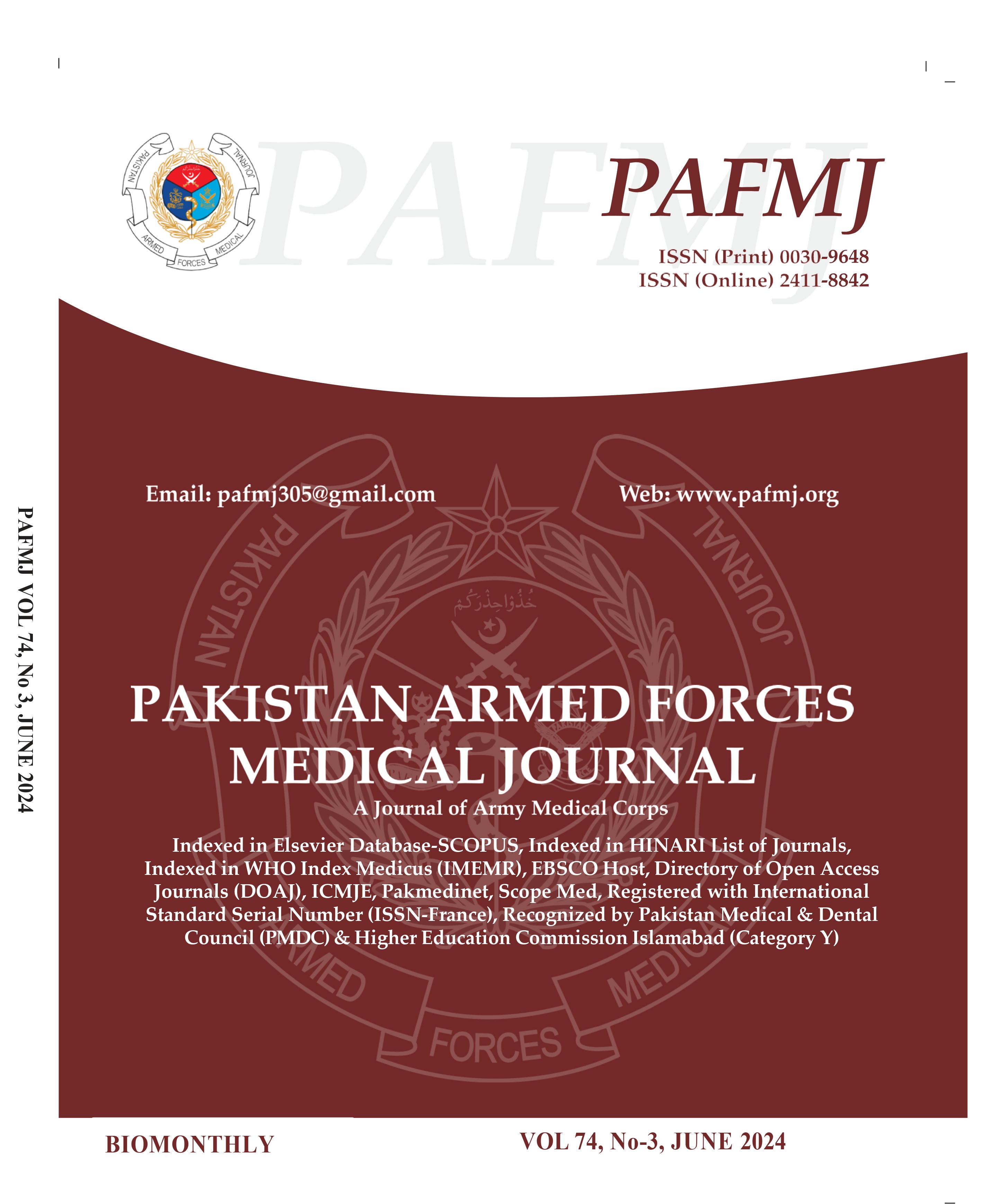Correlation of Socioeconomic Status And Anemia in Children Under Five Years of Age
DOI:
https://doi.org/10.51253/pafmj.v74i3.12409Keywords:
Anaemia, haemoglobin, RBCs, socioeconomic statusAbstract
Objective: To find the correlation between socioeconomic status and anaemia in children under five years of age.
Study Design: Cross-sectional study.
Place and Duration of Study: Tertiary Care Hospital Mirpur Khas, Pakistan from Jan to Oct 2021.
Methodology: The study included 500 subjects. Children who were less than 5 years old and presented to the hospital along with one of their parents were included. Demographic and socioeconomic data were measured.
Results: The study involved 500 children aged 1–5 years, with 44.6% male and 55.4% female. The majority were aged 0–1 years, and 16.8% were aged 3-5 years. The socioeconomic status of the participants varied, with 63.6, 20.6, and 15.8% having low, medium, and high levels. The frequency of anaemia (haemoglobin <11 g/dl) was 66.2% among participants, with 50.2% from low socioeconomic status, 11.2% from medium and high status, and higher rates among males.
Conclusion: The results of this study highlighted the disparities between socioeconomic status and health issues, underscoring the need for targeted interventions aimed at improving communities' economic status and mitigating the factors that increase population vulnerability
Downloads
References
Aliyo A, Jibril A. Assessment of anemia and associated risk factors among children under-five years old in the West Guji Zone, southern Ethiopia: Hospital-based cross-sectional study. PLoS One 2022 ; 17(7): e0270853.
https://doi.org/10.1371/journal.pone.0270853
Ibrahim ZH, Shallal AF, Hussein SH, Ibrahim RH, Mustafa BKh, Abdullah ShM, et al. Prevalence of anemia among children of Ranya District: Kurdistan Region, Northern Iraq. Eurasia J Biosci 2020; 14: 7659-7665.
Baldi A, Pasricha SR. Anaemia: Worldwide Prevalence and Progress in Reduction. InNutritional Anemia. Cham: Springer International Publishing; 2022.
Hameed HA, Khalil OA, Wissam E, Alezzi JI. Epidemiological Study of Anemia in Diyala Province/Iraq. Diyala Med J 2021: 20(1): 11-16. https://doi.org/10.26505/DJM.20015570906
Mbabazi E, Kanyamuhunga A. Prevalence of Anemia and Associated Socio-Economic Determinants amongst Malnourished Children Aged 6-59 Months, Centre HospitalierUniversitaire de Kigali (CHUK)–A Retrospective Observational Study. Rwanda Med J 2021; 78(3): 29-36.
Islam GMR. Association of Socioeconomic Status With Childhood Anemia Among Infant, Toddler, and Preschool Children in Bangladesh. Value Health Reg Issues 2020 ; 21: 141-148. https://doi.org/10.1016/j.vhri.2019.09.008
Balarajan Y, Ramakrishnan U, Ozaltin E, Shankar AH, Subramanian SV. Anaemia in low-income and middle-income countries. Lancet 2011; 378(9809): 2123-35.
https://doi.org/10.1016/S0140-6736(10)62304-5
Lemoine A, Tounian P. Childhood anemia and iron deficiency in sub-Saharan Africa - risk factors and prevention: A review. Arch Pediatr 2020 ; 27(8): 490-496.
https://doi.org/10.1016/j.arcped.2020.08.004
Al Kaabi SZ, Al-Saad DS, Al-Rubaye AK, Alkinani AAA. The association between the severity of anemia and socio-demographic factors among children under five years of age in Kut City. J Public Health Afr 2023 ; 14(8): 2676.
https://doi.org/10.4081/jphia.2023.2676
Shimanda PP, Amukugo HJ, Norström F. Socioeconomic factors associated with anemia among children aged 6-59 months in Namibia. J Public Health Afr 2020; 11(1): 1131.
https://doi.org/10.4081/jphia.2020.1131
Yang F, Liu X, Zha P. Trends in Socioeconomic Inequalities and Prevalence of Anemia Among Children and Nonpregnant Women in Low- and Middle-Income Countries. JAMA Netw Open 2018 ; 1(5): e182899.
https://doi.org/10.1001/jamanetworkopen.2018.2899
Rocha ÉMB, Lopes AF, Pereira SM, Leone C, Abreu LC, Vieira PD, Szarfarc SC. Iron Deficiency Anemia And Its Relationship
With Socioeconomic Vulnerability. Rev Paul Pediatr 2020 ; 38: e2019031. https://doi.org/10.1590/1984-0462/2020/38/2019031
Zuffo CR, Osório MM, Taconeli CA, Schmidt ST, da Silva BH, Almeida CC. Prevalence and risk factors of anemia in children. J Pediatr 2016 ; 92(4): 353-60.
https://doi.org/10.1016/j.jped.2015.09.007
Sumarlan ES, Windiastuti E, Gunardi H. Iron Status, Prevalence and Risk Factors of Iron Deficiency Anemia Among 12- to 15-Year-Old Adolescent Girls from Different Socioeconomic Status in Indonesia. Makara J Health Res 2018; 22.
https://doi.org/10.7454/msk.v22i1.8078
Suarjana, I, Nursanyoto H, Dewi, N. Protein and Iron Bioavailability, Perception, Menstrual Cycle as Adolescent Girls’ Anemia Factors. J Health Med Sci 2021; 4 (2): 84-93. https://doi.org/10.31014/aior.1994.04.02.159
Tesfaye M, Yemane T, Adisu W, Asres Y, Gedefaw L. Anemia and iron deficiency among school adolescents: burden, severity, and determinant factors in southwest Ethiopia. Adolesc Health Med Ther 2015; 6: 189-96.
https://doi.org/10.2147/AHMT.S94865
World Health Organization. Adolescent nutrition: A review of the situation in selected South-East Asian countries.[Internet]. Available at: http://www.searo.who.int/ LinkFiles/Nutrition_for_Health_and_Development_Adolescent_Nutrition_(Nut-163) (Accessed on December 16, 2021)
World Health Organization. Assessing the iron status of populations. .[Internet]. Available at: http://www.who.int/nutrition/ publications/micronutrients/anaemia_iron_deficiency/9789241596107/en/index (Accessed on December 16, 2021
Downloads
Published
Issue
Section
License
Copyright (c) 2024 Summyah Niazi, Aysha Babar, Mahwash Mengal, Ibrahim Liaqat, Raheela Adil, Shama Iqbal

This work is licensed under a Creative Commons Attribution-NonCommercial 4.0 International License.















